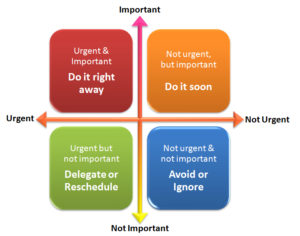Yes, you read the title right. You need to stop killing cockroaches right now, unless that’s your livelihood, and then maybe we’ll make an exception. Author Tony Morgan wrote a book centered around the idea of killing cockroaches, and the gist was this: as you move up in leadership and your responsibilities increase, be diligent in prioritizing your time, not simply doing things because you’ve always done them or because “someone needs to be doing it.” At one point in his career, Tony was in a CEO-type role, wearing a suit and tie, sitting in the executive office. And yet, in spite of his position and leadership, he came to the realization that he was still the guy everyone ran to when there was an actual cockroach in the building that needed to be squished. From that moment on, Tony turned his back on his cockroach-killing days and built a team around him so he could work in his strengths and focus on the responsibilities that ultimately fell on his shoulders.
“You decide where your time goes. You can either spend it moving forward, or putting out fires. You decide.… Click To TweetIt’s important that you evaluate your priorities every now and then to make sure that “killing cockroaches” doesn’t creep onto your To-Do list. Of course, there will be moments where you need rally the entire team to get something done, and that’s totally different. We absolutely see the value in being a team player and accomplishing goals together, and yet we also believe there’s value in each person on the team playing in their strengths and allowing others to do the same.
So, what is on your to-do list or considered part of your responsibilities right now that maybe needs re-prioritized? Take five minutes to assess that list, even jot down a few things if you don’t have a job description or KRA (Key Results Area). Bug extermination may or may not be on the list, but what about items such as ordering office supplies, swapping out burned light bulbs, emptying the coffee maker, fixing the copier if it jams, filling out purchase orders, reconciling bank statements, maybe even scheduling your own appointments? These tasks in and of themselves are not bad, and someone should be responsible for them. The question is, is that the best use of your time?
If you have trouble with prioritizing, or maybe need a refresher on an effective way to prioritize your time, take a look at this grid, adapted from Stephen Covey’s The Seven Habits of Highly Effective People. There are four quadrants, one for items considered urgent AND important, one for items that are important but not urgent, a box for items that are urgent but not important, and lastly, a box for items that are neither important nor urgent.

Ideally, most of your time would be spent in the top two quadrants, with a little margin in the third quadrant for the inevitable unplanned interruptions. If you have a lot of items hanging out in the third and fourth quadrants, it’s seriously time to re-prioritize, and consider delegating some of what you take care of so you can focus on the urgent and important. Not quite sure how to do that? Here are three tips to help you permanently cross “killing cockroaches” off your priority list!
- Identify specific tasks or responsibilities that need delegated. What items still need taken care of, but not necessarily by you? Once you have that list, move on to the next tip.
- Identify the team members around you to whom you can delegate. If you feel you cannot delegate to those on your team, it’s time to either look at a) training those team members so that you can delegate items to them, or b) finding team members who are deemed capable and trustworthy to handle items delegated to them.If you’re in a position to do so, it may mean hiring, or firing and re-hiring if someone is untrainable.
- Empower those to whom you delegate responsibility. Once you’ve delegated things out, trust those you’ve hired and trained to actually carry out what you’ve asked them to do! Micromanaging to ensure something gets done is almost as ineffective as you just doing the task yourself! There is risk associated with trusting others to do things instead of doing them yourself, but that is part of leadership and growing a team—empowering and equipping others to be effective in their strengths and abilities so you in turn can lead well and focus your time and effort to the responsibilities that only you can carry out for the team.
